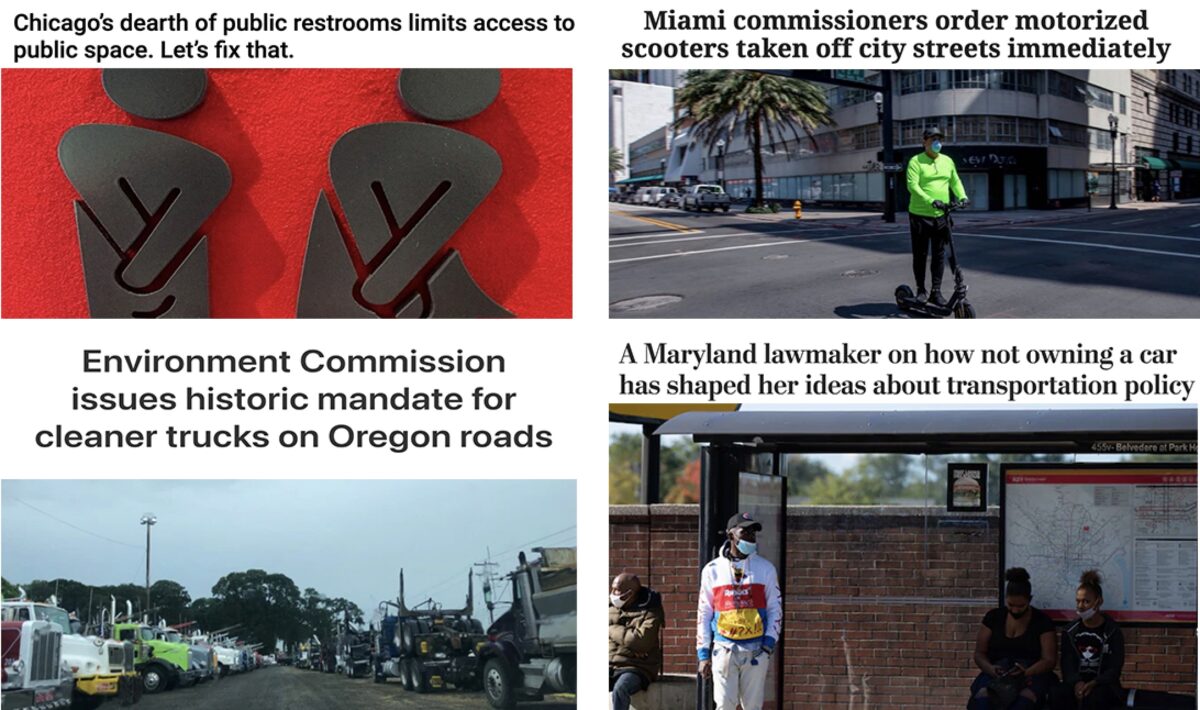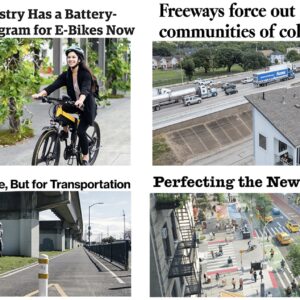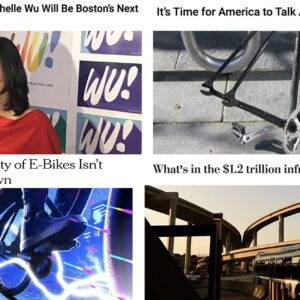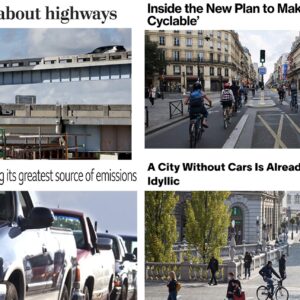Welcome to Monday esteemed readers. Before we share the most noteworthy items we came across in the past seven days, let’s give a big, warm, BikePortland welcome to our newest advertising partner, Action LED Lights! Action are the Portland-based distributor of Gloworm and Gemini lights. If you want to see and be seen, check them out.
Now onto the news you need to know as we head into this holiday week…
Cars are weapons: The suspect behind the wheel of an SUV in a vehicular violence rampage that killed five innocent people in a parade on Sunday has a lengthy record of reckless endangerment related to domestic violence and other crimes.
There are no accidents: Here’s a new book you should pre-order: An historical look at “accidents” with a major focus on traffic crashes and car culture.
Let them scoot!: City commissioners in Miami, Florida decided to get rid of electric scooters amid misguided concerns over safety in the same week they experienced massive, climate-change induced flooding.
Let the lobbying begin: The National Association of City Transportation Officials (NACTO) says Biden’s infrastructure funding could be a boon or a bane to progressive transportation reform — it all depends on how the money is spent and how good we are an influencing those decisions.
Advertisement
No bad projects: Non-profit policy think tank Transit Center (run by former Metro President David Bragdon) strikes a similar chord as NACTO when it comes to the Biden package in this excellent overview of the bill and what should come next from reformers.
Goodbye dirty trucks: The Oregon Dept of Environmental Quality has passed two new rules that will require truck manufacturers to sell cleaner trucks and get fossil fuel burning ones off the road.
When you need to go: I could not agree more with Streetsblog Chicago writer Courtney Cobbs when she says cities need to provide many more public restrooms in order for public spaces — and public transit — to reach its full potential.
Political case for carfree: Don’t miss this interview with Maryland state legislator Robbyn Lewis, where she explains how getting rid of her car has helped her connect dots between car supremacy, racism, and how cars contribute to an inequitable city.
Thanks to everyone who sent in links this week!









Thanks for reading.
BikePortland has served this community with independent community journalism since 2005. We rely on subscriptions from readers like you to survive. Your financial support is vital in keeping this valuable resource alive and well.
Please subscribe today to strengthen and expand our work.
Speaking of dirty trucks I wish large diesel trucks were required to have catalytic converters or something similar to keep the dirty soot from getting into my lungs.
Diesel vehicles over 8501 pounds GVWR are exempt from DEQ emissions testing! That’s lots of vans and pickups and much bigger vehicles. C’mon DEQ!
Jonathan – Hey would you review the text of the Miami scooter article?, as it looks like you ‘over editorized’ the description of the content, as I did not see any reporting that mentioned safety concerns were ‘misguided’.
Actually there is a more important issue in the text…the all too common disconnect internally between the legislative (council / commission) and mayoral (administration) on mobility.
sorry for the editorializing but it comes off as typical uninformed paternalism from folks who say, “It’s just too dangerous” when the fact is scooters are an important mode for a lot of people who don’t look like them and we desperately need non-car options, especially on the car-soaked streets of Miami. I mean seriously, they should ban cars before they ban scooters… especially in a place that is already sinking into the ocean due to all the GHG emissions we are pumping into the air.
Yes, I agree there is more ‘model paternalism’ in that comment in the article than their [assumed] reading of actual health and injury research. BUT…I am just pointing out that the purpose of the Monday Round Up is a scan of the news…vs. your editorial views. Let us read and decide.
BikePortland is your baby…but you can better place the editorial views in the editorial section. Just sayin’
thanks for the feedback todd. I don’t believe anything I said was untrue though. It’s a fact that those folks made a bad decision, I just want readers who scan to understand that right away. The lines between editorial and news have long been blurred here and given the urgency of the shit we’re dealing with, you’ll likely see that trend continue even more
There’s some irony in the article regarding public restrooms. It refers to the “Portland Loo” design being used in some cities, and there are some here. That said, since the pandemic the number of publicly available restrooms in downtown has gotten incredibly scarce.
I’m looking at you Patagonia. On a recent trip there (to sell a jacket to their ‘worn wear’ project) they had a closed bathroom and I ended up having to go buy a sandwich at whole foods to have a place to pee.
Lots of places that used to be open to drop into have since closed to the public. I get it, downtown is really strained, but damn, it’s hard to get excited about heading to downtown if it’s hard to find a place to pee.
I think businesses that are open to customers but still don’t have open restrooms are really not cool at all. It seems motivated by just not wanting to maintain the bathroom or deal with the hassle of customers (and god forbid non-customers) using them.
In 1970, there were more than 50,000 coin-operated public restrooms in the U.S, according to a 2017 article in Pacific Standard. Bloomberg CityLab reported that by the 1980s, pay toilets had almost vanished from the country for a variety of reasons-including lobbying from feminist organizations and student activists who saw pay restrooms as unjust. Fear of crime and vandalism also played a role.The September 11th attacks and fears of future terrorist acts accelerated the closure of many public restrooms.
Every time I visit Europe it’s really hard to find free public toilets, even in train stations and restaurants. Most public toilets are staffed and cost a nominal fee (50 cents is typical). Human excrement and pools of piss are common in public areas. Given the current worker shortage and rapidly increasing cost of labor at retailers and restaurants in the USA, I’m not surprised that toilets are the first to be closed off – cleaning toilets is a shitty job.
I think ( but I am not an expert) that any establishment that serves food that is ready to eat in Oregon is required to have a public restrooms for reasons of sanitation. I think they got a respite from that during Covid but should be called out on it now.
Alas, human excrement and urine are everywhere in Portland.
I’m surprised to hear that Europeans don’t use pay toilets. I figured they would be popular given the relatively low fee. But who carries coins these days? I almost never make cash transactions
I used pay toilets in Europe. But they were really only in densely urbanized areas. The self-cleaning ones were really cool…but on some of them there is a time limit and the doors open automatically.
No pun intended, I hope…..
One of my abiding memories of Portland as a child was seeing the homeless using the stall at the Greyhound station that had the door torn off it because they were coin operated.
Also, our public toilets ought to be squat toilets like I’ve seen overseas. No seat or bowl would go a considerable way toward lowering the cost of purchase, installation, maintenance and cleaning. Most people apparently treat the seat/bowl style that we have like squat toilets anyway.
Eh, I use to work in a restaurant that had a bathroom that folks could get in to and was favored for shooting heroin among the population that likes to shoot heroin. I’d say dealing with that is significantly more than a “hassle”. Especially when you have to take the door off because the person on the inside is passed out.
yeah I had a feeling someone would reply like this. I hear you. I can see how managing a bathroom is tough, but I think a lot of places could try harder to keep it open and safe and clean.
They probably have been trying hard to keep it open, safe, and clean. My office in downtown certainly doesn’t have unlocked toilets, nor do most offices around here have unbadged access. No one expects us to provide a public bathroom.
I don’t really see why we should expect minimum wage workers to provide this public good.
Having a place to go to the bathroom is a human right. The government should figure out the logistics instead of relying on private businesses to provide the public good. Plus, these places want their bathrooms to look good making them even harder to maintain. The Portland Loo is cheap, efficient to clean, hard to mess up, and much easier to reach a passed out person.
And I say this a person who pees 2-3 times if I’m out for 2+ hours.
The ones at the Hollywood Trader Joe’s get monopolized for similar purposes pretty often.
This is where the automated toilets I have seen in Australia have a good solution, if you aren’t done within the time limit the door opens and an alarm sounds until you get out.
Businesses that are open to the public are required to have restrooms open to “customers, patrons and visitors” with a few exceptions–ones open for quick transactions only, ones with small public areas, etc. I don’t think “visitors” is defined, and I assume there’s no rule against requiring someone to ask for a key. So while it seems clear enough that businesses don’t have to leave restrooms unlocked, or don’t have to give access to someone just coming in to use the restroom, it seems that many places that don’t give access to customers or patrons are violating the law.
https://codes.iccsafe.org/content/OSSC2019P1/chapter-29-plumbing-systems
The City of Vancouver (WA) installed a pair of Portland Loos at the new Waterfront and they seem to be doing well (the last time I used them last year)…the sad thing – related to the article – is that Vancouver’s waterfront district Developer Graymor [+ the City] was originally planning to NOT have a dedicated public restroom for the new 24/7 waterfront park and urban plaza but instead expect people to use bathrooms inside private buildings (retail and hotels). Thankfully a local business owner was on the committee and they correctly pointed out that many downtown businesses do not allow non customer use of restrooms (before COVID) and most have much more limited hours.
On public restrooms, there are indeed way too few (and Portland is marginally better than a lot of cities).
For those of you who haven’t heard of it, I highly recommend the https://www.refugerestrooms.org app — not only helps you find nearby restrooms but also includes ratings and comments about accessibility, gender-inclusiveness, and presence of changing tables.
Thank you for the link. It’s not always accurate, but it is far better than nothing, which is essentially Google Maps.
Thank you for the inclusion, Jonathan.
My typo: I meant to type “modal paternalism” vs. model. (Dang text auto correct)
The ICE heavy truck sales mandate is comical given that the bill requires 75% EV conversion in 9 years but Oregon only has one heavy duty truck charging station in the entire state. Regulations/plans that come with no additional revenue but set aspirational goals that require massive amounts of infrastructure should be sharply criticized, not celebrated. This is just another example of democratic party climate science denial.
On the other hand, one could ask why taxpayers should be put on the hook to pay to mitigate for the externalities that are generated by the private freight industry? Let the highly profitable private trucking companies foot the bill for the charging infrastructure that will be needed for their exclusive benefit. If you expect the public to pay to replace private infrastructure, you’d better be converting those profits into public assets, while you’re at it.
I have no sympathy for USAnian trucking companies and I have no sympathy for the tax travails of the middle to upper class consumer (e.g. most of Portland). Assigning blame to one end of the ecocidal ouroboros of Fordism while absolving the other is a form of climate science denial. If it were up to me both would be rapidly phased out.
Vijay Prarshad’s speech at the COP26 alliance forum captured my view of “don’t tax me” middle class climate activism perfectly:
https://twitter.com/MattKerrLabour/status/1462554957312319495
I’m not against the idea of using taxes and fees to encourage individuals and industries to clean up their emissions. I just don’t like the idea of transferring assets to pay private industry to do what they should be doing in the first place. You can achieve same effect with less market distortion by taxing carbon emissions and making fossil fuels more expensive. At the very least, the fuel tax exemption for freight vehicles should be eliminated.
In my original comment I used the term “revenue” which is neutral on whether the source is profit, wealth/assets, sharply progressive income, or flat income.
I’m not a fan of carbon taxes because in the context of existing capitalism they are regressive. This could be “fixed” but there simply isn’t much support for welfarism on the right, left, or center so I support targeting profit and wealth/assets over consumption taxes.
Even making the freight industry pay for their share of the external costs (pollution, road damage) ends up being regressive unfortunately.
Part of my job is setting up new items in our system (we’re a distribution company with retailers as our customers). My first question when I get pricing is “what’s the freight”, because I build that into our net cost and we mark up from there.
So, I know that if we made the freight companies pay their share, they will pass it onto folks like us and we’ll build it into our landed cost and mark up from there. Then the retailer will mark up from that.
I’ve come around to the notion that maybe that’s not the best way, because the extra costs end up being marked up not once, but twice and even three times or more (depending on how far down the distribution chain the retailer is).
Brings with it the worst features of a VAT (tax on tax on tax situation).
I don’t know *what* the best way is though.
I think the Environmental Quality Commission’s Clean Truck Rules are well intentioned and a step in the right direction, but the end result will be fewer new diesel truck sales in Oregon, more used truck sales, and more trucks brought in from out of state. I’m not defending commercial diesel trucks at all – they need stricter pollution regulations given the number of miles they normally travel (and let’s not forget marine transportation also). However, to be truly effective these rules need to be on a regional or national level (hey, California), and be extended to cover the existing fleet. Pollution checks need to be part of the vehicle registration process, like what they do for passenger cars in many states.
I don’t think these rules are a step in the right direction at all. They are more of the same “blah, blah, blah, blah” of unfunded regulation that relies on the good faith of amoral corporations to reduce emissions in some aspirational future decade. To paraphrase Vijay Prasad: Rich [states] are pretending they’re responding to the climate crisis while blocking real solutions.
I also think many “progressive” climate activist orgs are part of the problem in the way they sheepdog for reformless reforms as “first steps”, “transitions”, or being on the path to “net zero/carbon neutrality” in 2050/2060/2080/2100.
Says the “tenant advocate” staunchly opposed to private development of residential infill?
Unfortunately, most R2.5/R5 infill is not rental housing (and too little RM1/RM2 infill is rental housing which is disgusting). I opposed RIP because it did almost nothing to open bougie Portland neighborhoods to dense multifamily rental housing (e.g. the 10, 20, 30+ unit apartments I advocated for during my public RIP testimony) and greatly incentivized the construction of owned single household housing.
If it were up to me we would have zoning with unit minimums (e.g. illegalize the kind of housing that both YIMBYs and NIMBYs love).
So please try again.
Another argument in favor of more public toilets downtown is the changeover in the last several years to food cart dining. Even when office buildings and retail places started making their restrooms less accessible to the public, people could rely on restaurants, coffee shops, or food courts to find a restroom. Now so much food service is takeout windows and food carts, so that’s less of an option. It means more difficulty finding a restroom, and overloading of restrooms of any businesses that have them available, which also leads those businesses to restrict theirs more.
I can also see that restroom-finder app backfiring if it takes off, as businesses that get listed get increased restroom use.
I note that the toilet-finding app that Ivan referred to earlier in another thread also lists outdoor venues such as under the bridge, in a nearby fountain, behind buildings, in parks and so on, along with various ratings and comments. If a community doesn’t have convenient public toilets open during business hours, and businesses block access, then humans will find other likely-illegal outlets for taking care of business, as they already do for drugs, recreational bicycling, and drifting.
I remember locating a huge underground public toilet in Paris that happened to be closed when I got there – I knew it was closed not only because they put up a big sign, but also because there was a deep pool of urine and piles of excrement at the basement entry.
People gotta go somewhere…